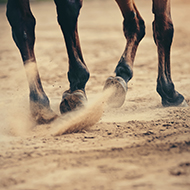Equine study reveals insights into hoof-ground interactions

"We were particularly intrigued to find that the horses and jockeys we studied appeared to operate within displacement limits" - Dr Kate Horan.
Horseshoes and ground surface conditions can significantly impact the upper body movements of horses and their riders, according to new research.
Horseshoes influence how horses’ hooves interact with different ground surfaces during the impact, loading and push-off phases of a stride cycle. As such, different horse-surface combinations could affect the magnitude and stability of movement patterns in horses and jockeys.
In the study, researchers measured the stability of movement patterns in horse-jockey combinations using inertial sensing technology. Four shoeing conditions – aluminium, barefoot, GluShu and steel – were trialled on turf and artificial surfaces.
Dr Kate Horan, a postdoctoral research assistant at the RVC, said of the research: “We were particularly intrigued to find that the horses and jockeys we studied appeared to operate within displacement limits, in an attempt to maintain stability in different shoe and surface conditions.
“Work of this nature may ultimately enable us to become prophylactic with regards to reducing the risk of falls, improving horse comfort, and preventing catastrophic injuries in equine athletes and their jockeys.”
The first-of-its-kind study, published in PLOS ONE, used 13 retired racehorses and two jockeys from the British Racing School. Sensor technology was fitted to the girth of the horses, at the pelvis of the jockeys, and the four shoeing conditions.
Dr Horan added: “It has been really exciting to be part of a team investigating the impact of farriery interventions on horse and jockey movement dynamics. We have demonstrated that a consideration of horseshoes and surfaces is paramount if we are to begin to understand the complexity of horse and jockey movements, and how they interact during high-speed locomotion.”



 The latest
The latest